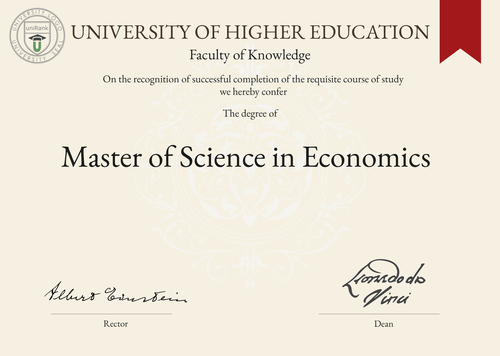
Master of Science in Economics (MSE)
Guide to Master of Science in Economics Program/Course/Degree
Master of Science in Economics (MSE)

Degree Name:
Master of Science in EconomicsDegree Abbreviation:
MSEDuration Range:
The duration of a Master of Science in Economics degree typically ranges from 1 to 2 years for full-time students. Part-time programs may take longer to complete. However, program duration can vary depending on the country and university.Tuition Range (US, UK, AUS, NZ):
Tuition fees for an MSE degree can vary significantly based on factors such as the country, university and whether the student is an international or domestic student. On average, annual tuition fees for an MSE program can range from $10,000 to $40,000 or more.Overview:
The Master of Science in Economics (MSE) is a graduate-level program that provides in-depth knowledge and skills in economics, including economic theory, quantitative analysis and policy analysis. It is designed to prepare students for careers in economics research, analysis and policy-making.Curriculum Overview by Year:
- Year 1: - Microeconomics Theory - Macroeconomics Theory - Econometrics - Applied Statistics - Research Methods in Economics - Year 2 (if applicable): - Elective Courses (Specialization) - Thesis or Research ProjectKey Components:
- Advanced Microeconomics and Macroeconomics - Econometric Analysis - Applied Statistical Methods - Economic Policy Analysis - Research Methodology - Elective Courses for Specialization (e.g., International Economics, Development Economics, Financial Economics)Career Prospects:
Graduates with an MSE degree have various career prospects in economics-related fields, including: - Economist - Economic Analyst - Policy Analyst - Financial Analyst - Research Economist - Data Analyst - Government EconomistSalary Expectations:
Salary expectations for MSE graduates can vary based on factors such as location, level of experience, industry and job role. On average, professionals with an MSE degree can earn competitive salaries, often higher than those with only a bachelor's degree in economics.Conclusions:
It's important to note that degree duration, tuition fees, curriculum, key components, career prospects and salary expectations for a Master of Science in Economics (MSE) degree can vary: - By the chosen country where you study the degree. - By the chosen university or institution where you pursue the degree. Prospective students interested in pursuing an MSE degree can use the uniRank World Universities Search Engine to find institutions offering this program worldwide. Choosing the right MSE program and institution that align with your career goals is essential for success in the field of economics.World Universities Search Engine
search for Master of Science in Economics (MSE) and add the Location (country, state etc.) or specific University you are interested in studying at.
Query examples:
- Master of Science in Economics (MSE) United States
- Master of Science in Economics (MSE) United Kingdom online
- Master of Science in Economics (MSE) Australia international students
- Master of Science in Economics (MSE) University of California
- Master of Science in Economics (MSE) University of London tuition fees
- Master of Science in Economics (MSE) University of Sydney scholarships
Share Program/Course
Interesting? Share this program/course/degree info with your friends now.